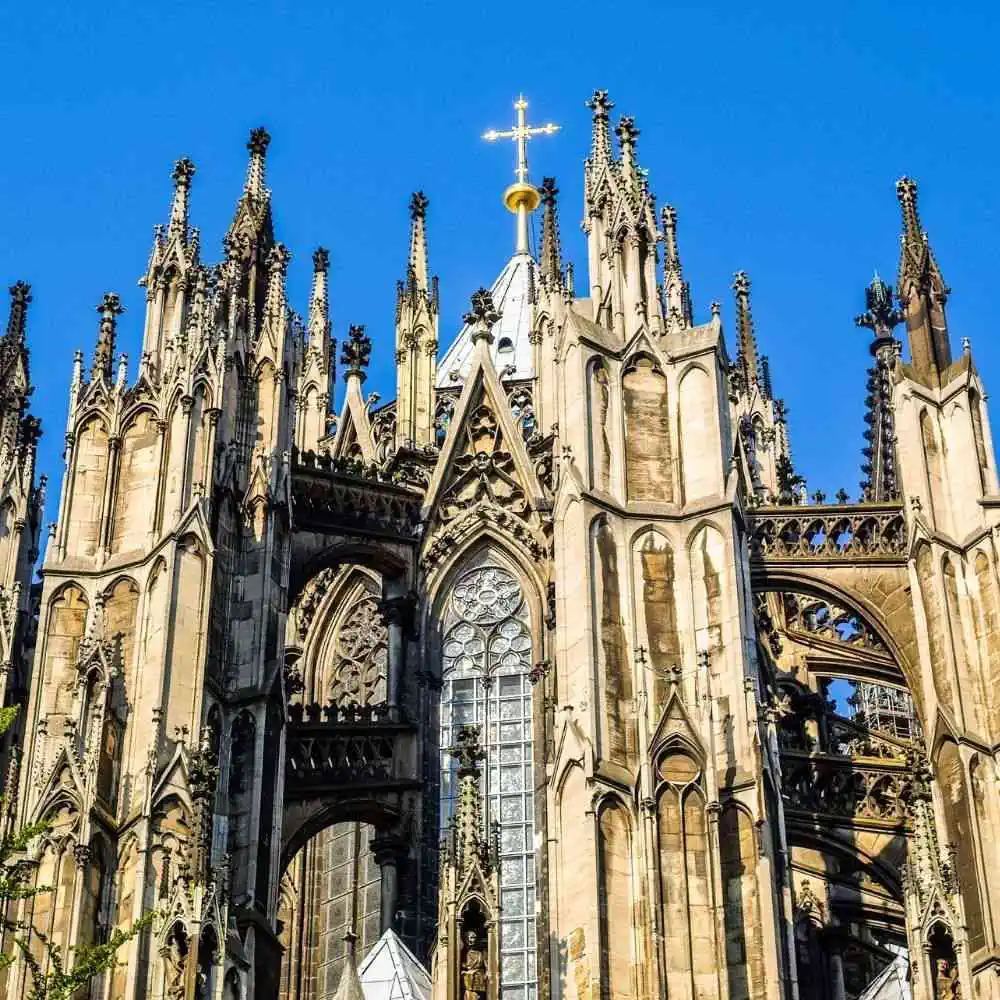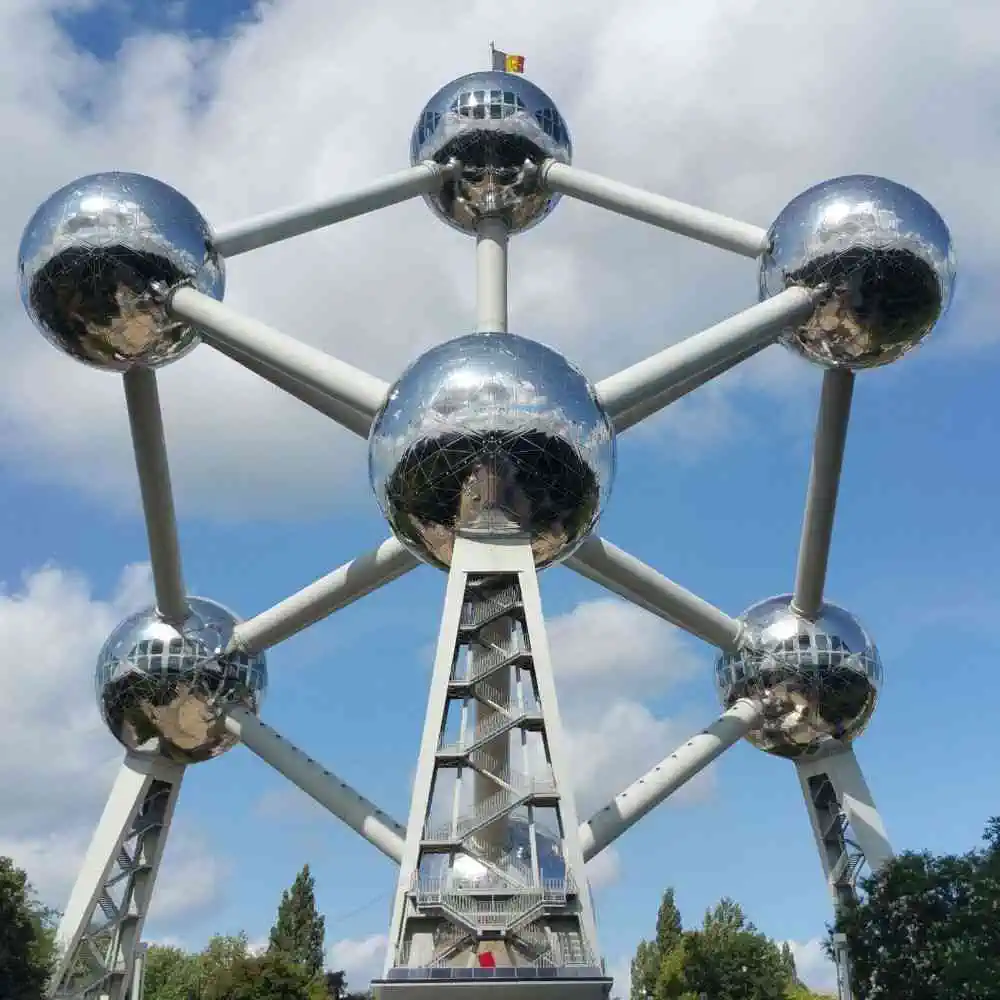You will depart from Bruxelles Central, located right in the city center of Brussels, and enjoy the beautiful scenery of the journey while you arrive in Cologne, also located in the heart of Cologne.
Trains from Brussels to Colognefrom € 40.00
Trains from Brussels to Cologne
Travelling by train: Brussels - Cologne
The High Speed Trip from Brussels to Köln
If you are looking for a high-velocity journey, then you can hop on a train from Brussels to Köln. This scenic trip takes you from Belgium to the German Rhine Valley and promises lots of beautiful landscapes and adventures. The journey takes approximately four hours and covers a distance of 330 km, zipping through the towns and cities of Aachen, Liège, Leuven, and Bonn with a couple of stops along the way.
The most iconic item to watch out for during the departure from Brussels is the famous Atomium monument, a structure composed of nine steel-clad spheres that represent an iron crystal magnified 165 billion times. During your journey, make sure to take in the stunning views of the Ardennes Forest, the rolling hills of the Belgian countryside, and the KM of vineyards on the hillsides of the Rhine.
Upon arriving at Köln, the most iconic landmark is the Gothic beauty of the magnificent Kölner Dom, a stunning piece of architecture that stands tall above the quaint streets of this vibrant city. From the cobblestoned Old Town to the chocolate-brown beer houses, it’s an idyllic destination for a getaway.
The Brussels to Köln train ride is an exciting way to explore the beauty of Central Europe and the rich culture of two unique countries. So, whether you’re in for an adventure or a relaxing break, this journey promises fascinating views, mouth-watering cuisine, and plenty of memorable experiences.

Journey details
How long does that train from Brussels to Koeln take?
The train from Brussels to Koeln takes approximately 3 hours and 52 minutes. However, this can vary depending on the day and time of departure.What is the fastest journey from Brussels to Koeln by train?
The fastest journey from Brussels to Koeln is the ICE International train, which takes around 3 hours and 25 minutes.How much does the train cost from Brussels to Koeln?
The cost of the train from Brussels to Koeln varies depending on the type of train and the time of departure. Generally, you can expect to pay between €46.90 and €79.90.How much does the Brussels to Koeln?
Yes, there is a direct train from Brussels to Koeln.What is the distance from Brussels to Koeln by train?
The distance between Brussels and Koeln by train is 577 kilometers (359 miles).Which are the cities that the train stops from Brussels to Koeln?
The train stops at several cities, including Aachen, Düsseldorf, Duisburg, and Essen, before arriving in Koeln.Buy train tickets from Brussels to Cologne
Traveling by train from Brussels to Cologne is an easy and comfortable journey. RailClick is the best way to travel Europe by train.
Brussels: Places to see
Brussels, the capital of Belgium, is a city full of architectural wonders and gastronomical delights. From cobblestoned streets and ancient monuments to world-renowned chocolate and beer, this city has something for everyone. Let’s take a deeper look into some of the top sites to make sure your trip to Brussels is complete.
Grand Place: Located in the centre of the city, this UNESCO World Heritage Site is a must-see. Admire the ornate buildings, from the city hall, to the guild houses, and the striking gothic churches, all surrounded by terracotta-hued buildings. Open to the public all year round, entry to Grand Place is free.
Manneken Pis: This famous statue of a little boy urinating is perhaps the most iconic symbol of Brussels. Check out the many costumes the figure wears, which change regularly. Find it just a few minutes’ walk from Grand Place.
Atomium: This iconic landmark made up of steel spheres is the symbol of Brussels. First constructed in 1958, it was renovated in 2006 and is now a museum that delves into the history of Brussels and its people. Open daily from 10am to 6pm, tickets cost €12.
Cinquantenaire: This sprawling urban park, located to the east of the city, features a mixture of art galleries, museums, and monuments, including the Royal Military Museum and Autoworld. Open all year round, admission to most of the attractions here is free.
Royal Palace of Brussels: Catch a glimpse of grandeur from this 19th century building, which serves as the official residence of the Belgian Royal Family. Open to the public from July to September, tours of the palace cost €8.
Cathedral of St. Michael and St. Gudula: This gothic-style cathedral dates back to the 13th century and features beautiful stained glass windows and tombs. Open to the public from April to October, admission is free.
Delirium Café: One of Brussels’ most famous bars, this lively spot offers a huge selection of beers. With a whopping 3,000 varieties to choose from, there’s something here for everyone. Open daily until 4am, it’s the perfect place to end your night out in style.
So there you have it! From iconic monuments to fantastic food and drink, Brussels has something for everyone. Be sure to make the most of your trip and don’t forget to take plenty of pictures!

Cologne: Places to see
Cologne, in Germany is a beautiful destination to visit for those interested in history and architecture. With its stunning Romanesque churches, a fascinating Jewish history, and a vibrant arts and entertainment scene, a trip to Cologne is sure to be a memorable one.
Cologne Cathedral (Kölner Dom): Located in the heart of the city, the magnificent Cologne Cathedral is the city’s main landmark and a UNESCO World heritage site. It is famous for its impressive Gothic facade, its unique stained glass windows, and its treasury. Visit in the early evening for a breathtaking view of the majestic spires of the Cathedral lit up in the night sky. Location: Domkloster 4, 50667 Köln, Germany. Hours: 6:00 AM–9:30 PM. Entrance Fee: €9.
Augustusburg Castle (Schloss Augustusburg): Set atop a hill in nearby Brühl, Augustusburg Castle is the former residence of the prince-electors of Cologne. Built in the Baroque and Rococo styles, it is a stunning architectural masterpiece. Inside, you can admire the beautiful Golden Gallery and the exquisite Court Chapel. Location: Schlossplatz 2, 50321 Brühl, Germany. Hours: 9:00 AM–5:00 PM. Entrance fee: €7.
Chocolate Museum (Schokoladenmuseum): The Chocolate Museum is a must-visit for any chocoholic. Here, you can learn all about the history of chocolate and sample some delicious treats. With its interactive exhibits, workshops, and a café serving over 20 varieties of hot chocolate, this is sure to be a sweet experience. Insider tip: make sure to try the fondue fountain! Location: Am Schokoladenmuseum 1a, 50678 Köln, Germany. Hours: 10:00 AM–6:00 PM. Entrance Fee: €11.
Wallraf-Richartz Museum & Fondation Corboud (WDR): This world-renowned museum houses an impressive collection of European art, with masterpieces from the Middle Ages to the 20th century. Highlights include paintings by Rubens, Baroque sculptures, and a modern art collection. Location: Martin-Luther-Platz 3, 50676 Köln, Germany. Hours: 10:00 AM–6:00 PM. Entrance Fee: €9.
Cologne Zoo (Zoologischer Garten Köln): Visit the oldest and largest zoo in Germany, located on the banks of the Rhine River. This zoo is home to over 7,500 animals, including many endangered species. It also features a stunning Japanese Garden and an aquarium. Location: Riehler Str. 173, 50735 Köln, Germany. Hours: 9:00 AM–5:00 PM. Entrance Fee: €19.
Roman-Germanic Museum (Römisch-Germanisches Museum): Explore the history of the city by visiting this museum located in the heart of the city. Here, you can see ancient artefacts and relics from the city's past, including the famous Dionysius mosaic. Location: Roncalliplatz 4, 50667 Köln, Germany. Hours: 9:00 AM–6:00 PM. Entrance Fee: €4.
Keulen Restaurant: For a true taste of Cologne, head to Keulen Restaurant. Sample some of the city's classic dishes such as the famous Halver Hahn (cheddar cheese sandwich with onions and mustard) or try some Reibekuchen (potato pancakes). Location: Am Hof 12–14, 50667 Köln, Germany. Hours: 11:00 AM–6:00 PM.
Cologne is an exciting city offering a range of attractions to explore. From its stunning architecture and rich history, to its delicious cuisine and vibrant entertainment, there’s something for everyone in Cologne. Make sure to add it to your travel list!

Brussels: Main train stations
Brussels, the capital of Belgium, has its main train station "Brussels-Central" located right in the city centre. It's the largest and busiest station in the country. From there, you can reach all important Belgian cities and even other European countries. The city also hosts several other minor stations such as Bruxelles-Midi, Brussels-North and Brussels-Luxembourg.
Brussels-Central is located at Rue de l'Infante Isabelle 1, 1000 Brussels. The station is open 24 hours a day, 7 days a week. For more information you can call +32 2 224 12 11. It also provides facilities such as ATM, restaurants, toilets, lockers and luggage storage.
- Brussels
- Brussels Midi/Zuid
- Brussels Airport - Zaventem
- Bruxelles-Luxembourg
- Bruxelles-Nord
- Bruxelles-Schuman
- Bruxelles-Chapelle
- Brussel Congres
- Brussel-West
Cologne: Main train stations
Köln or Cologne is a historic city located in Germany. The main train station in Cologne is simply referred to as the Köln Hauptbahnhof, located in the city center. It serves as the hub of regional and nation wide regional trains, with connections to destinations throughout the country and even international ones. There also other train stations in the city such as the Köln-Deutz for visitors of the LANXESS Arena and the Köln-Nippes for the North of the city.
Köln Hauptbahnhof is the main station of the city, located at 50665 Köln, Germany. It is open 24 hours, and visitors can find services such as information counter, ticket office, toilets, currency exchange, shops, restaurants, and a luggage storage. There is also accessible transport such as taxis and public buses available to and from the station. To contact the station, visitors can either call +49 221 14850 or visit the website.
- Cologne
- Cologne Messe/Deutz
Brussels - Cologne: How to get the best deals
Book in Advance:
Just like with airfares, train ticket prices tend to rise as the departure date gets closer. Booking weeks or even months in advance can save you a significant amount.
Travel During Off-Peak Hours:
Avoid traveling during peak times such as weekday mornings and evenings. Opt for midday, late evening, or mid-week rides when there's less demand.
Consider Slower Trains or non direct routes:
Express or high-speed trains might save time, but they're often pricier. Opting for regional or slower services can reduce your fare.
Look for Special Deals and Promotions:
Train operators occasionally have promotions or special deals, especially during off-peak seasons. It's worth signing up for newsletters. Additionally, there are sometimes group or return ticket discounts, so consider these options if they fit your travel plans.
- Contact Us


